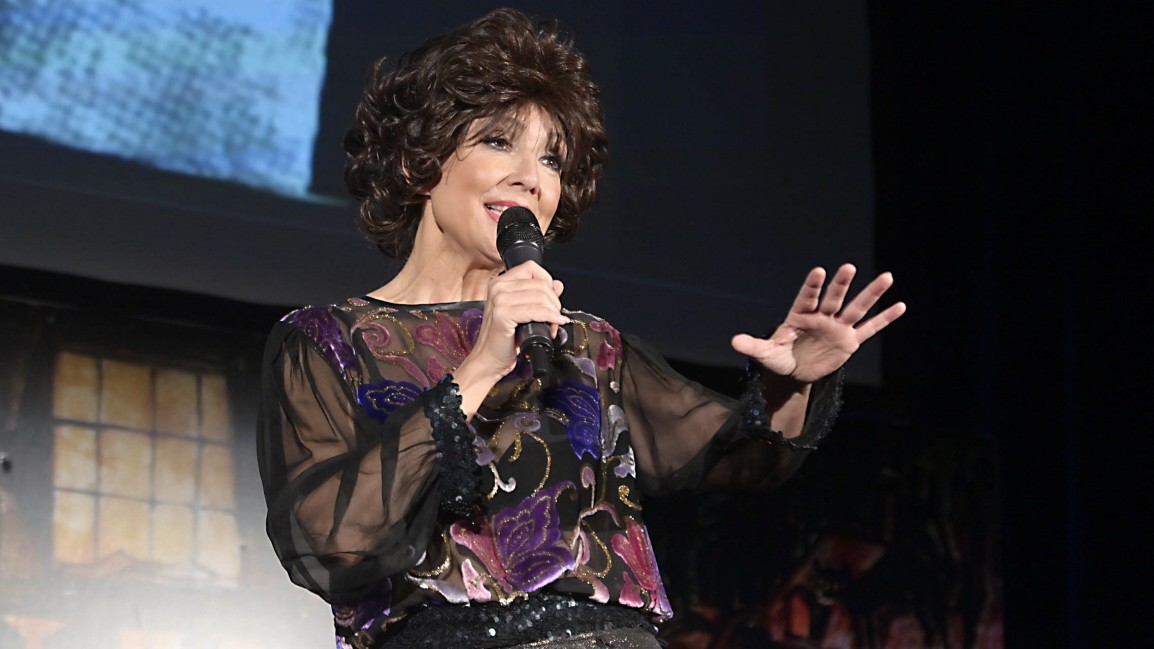It’s a cross when no attractive men cross your path in life. No temptation that cannot be resisted. A mood creeps into your heart that makes you peaceful, almost demure. “For lack of opportunity, I’m just loyal,” sings Cornelia Corba in the role of Schwabing Gisela, “the state, I want to be honest, is completely new to me.”
Her voice is not quite as smoky and dark as that of the legendary landlady and singer who opened her famous bar “Bei Gisela” on Occamstrasse in 1952 (today “Vereinsheim”). But the lively implementation of the chanson, which winks at questions of morality with slightly frivolous amusement, is rousing. Flanked by Thomas Killinger, her virtuoso accompanist at the piano, Corba moves appropriately and charmingly across the stage, filling the hall in the Kleiner Theater Haar with her voice, which also unfolds a beautifully dark timbre.
It was also well filled, as far as this is possible under Corona conditions (with mask-free seating option), and the audience willingly let itself be carried away. The stage of the Art Nouveau theater was illuminated in orange on the flanks, as was the curved street lamp in the middle, framed by a painted Schwabing backdrop from the post-war period. A bar stool, a high table and a chair completed the scenery, above which was a screen on which original images were projected. Corba, born in Munich in 1969, has a weakness for strong women who shaped her hometown. The actress, singer and dancer in Haar, supported by Killinger, delivers an impressive one-woman show. Her concert performance “But the Nowak will not let me go to waste” is dedicated to Gisela Jonas, who was born in Moers in 1929 and came to Munich in the late forties – and was supposed to make a career there as a “Sterntaler child in the German economic miracle”.
The show in Haar follows the chronology of the events, embeds the event in its historical context via voice-overs and images. As Gisela, Corba tells of exciting life stages including anecdotes about prominent guests. And of course she sings: Among them are songs by Zarah Leander (“Just don’t cry out of love”, “Can love be a sin?” “This evening I invite myself to love”), hits like “Tell me Quando, tell me when “and of course the cheeky-frivolous chansons that are particularly associated with the Schwabing icon: In addition to the said” For lack of opportunity “, especially the” Nowak “, which in Gisela Jonas’ version was in the hit lists for a long time, and that too “Schwabinger Laterne” walking calmly and melodiously through the dark alleys (“Softly sounds from afar, dream city melody”). This song probably has the strongest nostalgic note of the show: Because Schwabing is, according to the bon mot of Franziska zu Reventlow, not a place, but a state. A situation that is often lamented as past – not much is left of the attitude towards life in the bohemian district before the First World War. And Schwabing is no longer the much admired center of nightlife with its disreputable and ambitious character, which it was especially in the sixties and seventies. The once excessive Munich carnival can now only be imagined as a farce.
For Gisela Jonas, however, the famous district was a place of longing to which she preferred Paris and other metropolises. Of course, she has also hosted the world: Leonard Bernstein, Salvador Dali, Herbert von Karajan, Ava Gardner, Orson Welles, Erich Kästner or Princess Soraya. Hollywood star Kirk Douglas wanted to borrow her 1929 BMW Dixie for a jaunt and apparently had some action: “Can I race with the oldtimer?” he is said to have asked her, breaking the wheel. The beer mat on which Franz Josef Strauss had a letter written on in her restaurant is in the museum today: it is marked with 18 masses, as Corba tells the public in Haar.
As the protagonist of the evening, whose outfit has something of an Abba glitter costume, she is challenged a lot, lyrically and singingly. She interprets the disreputable texts – those that “channel unspeakable thoughts into the brains of men”, as it is once said, and which Gisela brought in the verdict of a Munich court that she was an “educated lady with a strongly indecent character”, with relish. It shows the coquette, sometimes naive, but always the unconventional, ungovernable seeker of Gisela. It’s nice that there were also quieter songs and moments of pause, like the one when Gisela briefly thought of suicide on the banks of the Isar. Dramaturgically, the evening is held together not least by the sometimes very appealing original photos or painted portraits. You learn nice anecdotes, like that of the young Mr. Bockelmann, who once stepped in as a singer when Gisela was away to film – later he called himself Udo Jürgens; or the story of her larynx, which in later years after an operation – she was a heavy smoker – she had to close it in order to still be able to sing. But some things remain unsaid and a little on the surface: Why Lilian Harvey gave the opening speech in 1952 with a very young, unknown landlady, why all these world stars came to her restaurant, is not explained in more detail. As a person, Gisela Jonas-Dialer, who married the Tyrolean Luis Dialer in 1965, comes closer in her longings and breaks, but some things remain on the surface. She was not only the singer of lines like “I check my sexually gifted zones and know about 30 positions”, but also wished for “a man who dares and can.” Yes, who doesn’t want to invite love every evening? And stay true to her.
– .

